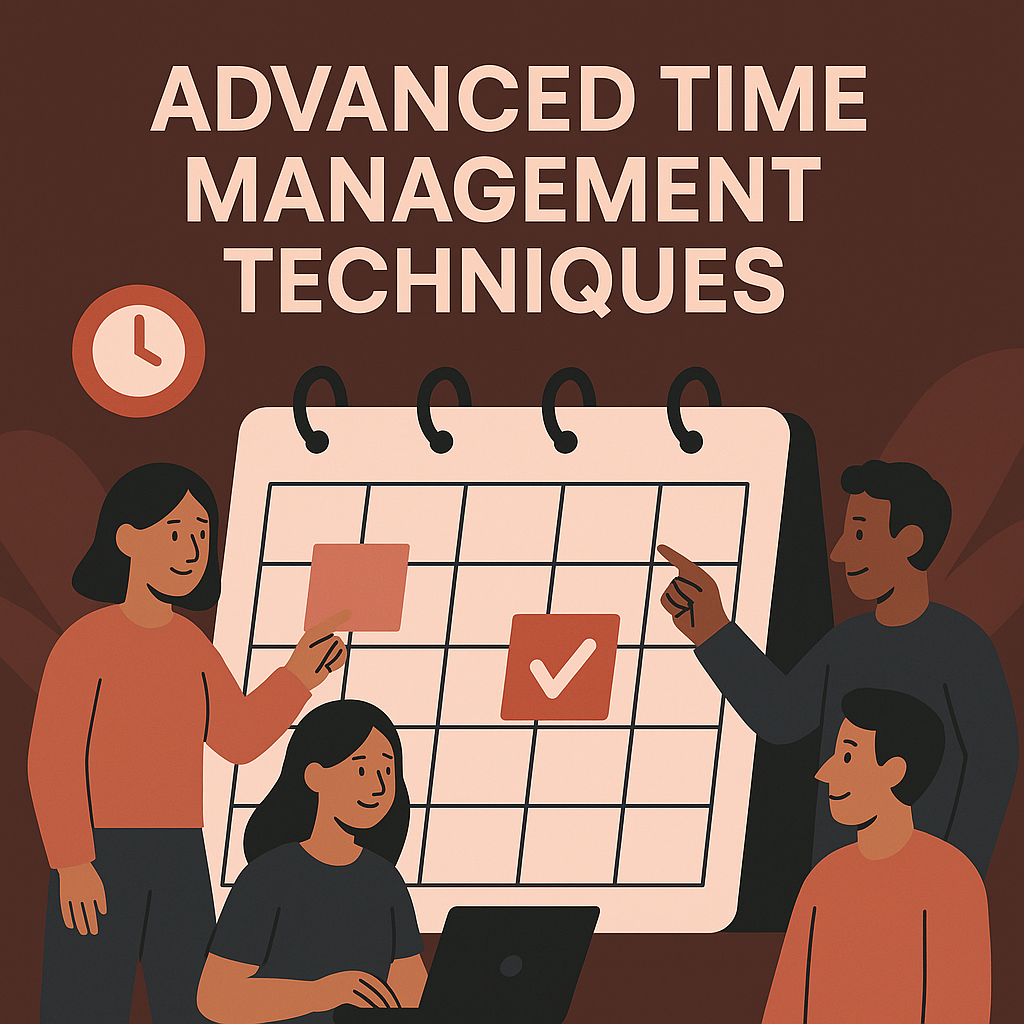In This Article
Productivity is more than just checking tasks off a to-do list. It's about optimizing how we work, think, and live to achieve our goals efficiently and effectively. While productivity apps like Temporalo are necessary, you'll get more from implementing time-management techniques if you understand the underlying physical, psychological, and social factors that influence your performance. This article explores evidence-based approaches to productivity, drawing exclusively from scholarly research and authoritative sources.
The Physical Foundations of Productivity
Exercise: Your Brain's Best Friend
Exercise doesn't just benefit your physical health—it dramatically enhances cognitive function and productivity. Research shows that aerobic activity increases blood flow to the brain, delivering oxygen and nutrients that improve brain function and assist in neurogenesis (the formation of new neurons)[2].
Physical activity stimulates the release of crucial neurotransmitters including dopamine, noradrenaline, and serotonin, which support brain cell growth, motivation, stress management, and focus. These biochemical changes directly translate to improved work performance[2].
Exercise also strengthens neural connections, improving brain plasticity—our ability to learn and adapt. Additionally, regular physical activity promotes better sleep, indirectly contributing to improved memory, cognitive function, and overall performance[2].
The good news? You don't need marathon training sessions to reap these benefits. Even 20-minute exercise sessions can produce significant cognitive enhancements, making physical activity one of the highest-return investments for your productivity[2].
Nutrition and Cognitive Performance
What we eat directly impacts how we think and perform. A study examining the correlation between eating habits and academic achievement among 577 university students found that breakfast consumption had a positive effect on self-reported GPA, while fast food consumption had a negative effect[3].
The researchers concluded that "healthy eating habits have a positive effect on students' academic performance," though they noted that other factors such as sleep habits may be equally or more important[3]. This suggests that nutrition should be viewed as one component of a holistic approach to productivity.
Regular, balanced meals—particularly breakfast—provide the brain with necessary glucose for optimal cognitive function. Skipping meals can lead to energy crashes, reduced concentration, and diminished mental acuity—all enemies of sustained productivity[3].
Establishing Effective Routines
The Power of Structured Daily Routines
A well-structured daily routine forms the foundation of sustained productivity. Research indicates that faculty members who write regularly are more productive than those who "binge write," highlighting the importance of consistent habits[1]. Creating a daily schedule with specific time blocks for different activities helps manage time efficiently and ensures adequate attention to all important areas of life.
Effective routines should include:
- Designated time for focused work
- Breaks to prevent mental fatigue
- Physical activity
- Social interaction
- Personal development
- Rest and recovery
By establishing clear routines, we reduce decision fatigue—the mental exhaustion that comes from making too many decisions—and create a framework that supports consistent productivity[4].
Finding Your Peak Productivity Windows
Not all hours of the day are equally productive for everyone. Understanding your chronotype—whether you're naturally more alert in the morning, afternoon, or evening—can help you schedule your most cognitively demanding tasks during your peak performance windows[6].
To identify your most productive times, experts recommend experimenting with different work schedules while tracking your energy, focus, and output. Once identified, these golden hours should be protected and reserved for your most challenging work[6].
Building Flexibility Into Your Schedule
While structure is important, rigid schedules often lead to frustration when unexpected events arise. Building buffer time into your routine allows for adjustments without derailing your entire day. This flexibility helps maintain momentum even when plans change[6].
A balanced approach to scheduling acknowledges that productivity isn't about maximizing every minute but about sustainable, consistent progress toward meaningful goals. Research on academic productivity suggests that efficiency is a key factor in research output, highlighting the importance of using time strategically rather than simply working longer hours[5].
Social Dimensions of Productivity
Balancing Work and Social Life
Contrary to the myth that productivity requires social isolation, research suggests that a balanced approach to work and social life actually enhances overall productivity. A comprehensive guide from Vita Student emphasizes that setting boundaries is key to juggling academics and social life effectively. This includes establishing specific hours dedicated to focused work and communicating these boundaries to others[4].
The guide also recommends engaging in activities outside your primary work or academic sphere—joining clubs, sports teams, or pursuing hobbies—to provide creative outlets and build social connections that support well-being[4].
Social Interactions and Team Performance
Research on team productivity reveals that social interactions in the workplace can generate reciprocal peer effects and narrow the "psychological distance" among coworkers, particularly in tasks requiring complementary skills[7]. Social connections increase the sense of accountability and can enhance motivation through positive peer pressure.
Additionally, social interaction provides opportunities for knowledge sharing, creative collaboration, and problem-solving that may not emerge in isolation. However, the research also suggests that the optimal amount of social interaction depends on the type of task being performed and the structure of the team[7].
The relationship between social connection and productivity highlights why completely isolating yourself may be counterproductive. Instead, the research suggests managing social interactions strategically: building meaningful connections while establishing boundaries that protect your focused work time.
Psychological Elements of Peak Performance
The Role of Passion and Motivation
Academic research on productivity identifies passion as one of six top-tier variables influencing research output, alongside funding, investigator quality, efficiency of the research environment, research mix, and analytic accuracy[5]. This suggests that intrinsic motivation significantly impacts our ability to produce quality work efficiently.
When we're genuinely interested in and passionate about our work, we're more likely to enter a state of flow—complete absorption in the task at hand—which is associated with higher productivity and satisfaction. Finding ways to connect with the purpose behind your work can therefore boost your productivity by enhancing intrinsic motivation[5].
Managing Distractions and Setting Boundaries
Distractions represent one of the biggest obstacles to productivity in the modern world. Research published in medical journals acknowledges that "we all struggle with issues or habits that distract us and make us less productive"[1]. The study notes that identifying specific causes of procrastination and developing techniques to minimize time spent on unimportant tasks is crucial for scholarly productivity.
Practical strategies for managing distractions include:
- Designating specific times for checking email and messages
- Creating a clutter-free work environment
- Using tools to block distracting websites during focused work periods
- Communicating boundaries to colleagues and family members
- Scheduling regular breaks to prevent the urge to seek distractions during work sessions[1][4]
By proactively managing potential interruptions, we create the conditions for sustained focus and higher productivity.
Making Everything Count Twice: Efficiency Multipliers
One fascinating strategy for increasing productivity comes from academic research: the principle of "making everything count twice." Faculty members can boost scholarly productivity by finding ways to use the same work for multiple purposes—for example, turning clinical experiences into educational materials and then into published articles[1].
This principle can be applied in nearly any field:
- A presentation can become a blog post
- Research for one project can inform another
- Client work can generate case studies
- Problem-solving approaches can be documented and reused
This approach doesn't just save time—it creates a compounding effect where each effort yields multiple outputs, dramatically increasing overall productivity[1].
Practical Strategies for Increasing Productivity
Based on the scholarly research reviewed, here are evidence-based strategies to enhance productivity:
1. Implement Regular Exercise
Even short bouts of physical activity can boost cognitive function. Aim for at least 150 minutes of moderate aerobic activity per week, ideally spreading it throughout the week rather than concentrating it on weekends[2].
2. Optimize Nutrition for Cognitive Performance
Never skip breakfast, limit fast food consumption, and maintain regular healthy eating patterns with adequate hydration throughout the day[3].
3. Establish a Consistent Daily Routine
Create a structured schedule that aligns with your chronotype, reserving your peak cognitive hours for the most demanding tasks[1][6].
4. Use the "Make Everything Count Twice" Principle
Find ways to repurpose your work for multiple outcomes, maximizing the return on your time investment[1].
5. Practice Regular, Scheduled Work Instead of "Binge" Productivity
Research shows that faculty who write regularly are more productive than those who engage in marathon sessions sporadically[1].
6. Set Clear Boundaries
Establish and communicate specific times for focused work, during which you limit interruptions from calls, emails, and social media[1][4].
7. Maintain a Balanced Lifestyle
Ensure your routine includes time for work, physical activity, social interaction, and adequate rest[4].
8. Engage in Activities Outside Your Primary Work Domain
Participate in clubs, sports, or hobbies that provide a creative outlet and build social connections beyond your professional sphere[4].
9. Identify and Manage Your Specific Distractions
Recognize your personal procrastination triggers and develop targeted strategies to address them[1].
10. Know When to Say "No"
Avoid overcommitment by declining requests that don't align with your priorities and goals[4].
The Productivity Ecosystem: Integrating Multiple Approaches
The research clearly shows that productivity isn't enhanced by any single factor but by the integration of multiple complementary approaches. A model presented for academic research productivity comprises six interrelated factors: funding, investigator quality, efficiency of the research environment, research mix, analytic accuracy, and passion[5].
This suggests that a similar ecosystem approach applies to personal productivity, where physical well-being, psychological factors, environmental conditions, and social context all interact to determine overall output. Rather than focusing exclusively on any one productivity technique, we should aim to create a balanced ecosystem that supports high performance across multiple dimensions.
Conclusion
Productivity isn't a one-size-fits-all concept, nor is it simply about working harder or using the right apps. As the research reviewed in this article demonstrates, true productivity emerges from a holistic approach that acknowledges the interconnectedness of physical health, psychological well-being, social connections, and structured routines.
By incorporating evidence-based strategies—regular exercise, optimized nutrition, consistent routines, social balance, and distraction management—you can create the conditions for sustained, high-quality productivity. The key is to view productivity not as a constant sprint but as a well-paced marathon supported by healthy habits and balanced living.
Rather than chasing productivity through willpower alone, focus on building systems and environments that naturally foster efficiency and effectiveness. As the research suggests, sometimes the best productivity hack isn't a hack at all—it's taking care of your fundamental human needs for physical activity, good nutrition, meaningful connections, and purposeful structure.
References
2. The power of a workout: Can exercise boost your grades? (2025)
3. The influence of eating habits on the academic performance of university students (2020)
4. A guide to balancing uni studies with your social life (2024)
5. Analytic model for academic research productivity having factors, interactions, and implications (2011)
6. How to create a study routine that maximizes productivity (2024)
7. The Effect of Social Interactions on Team Performance (2023)

